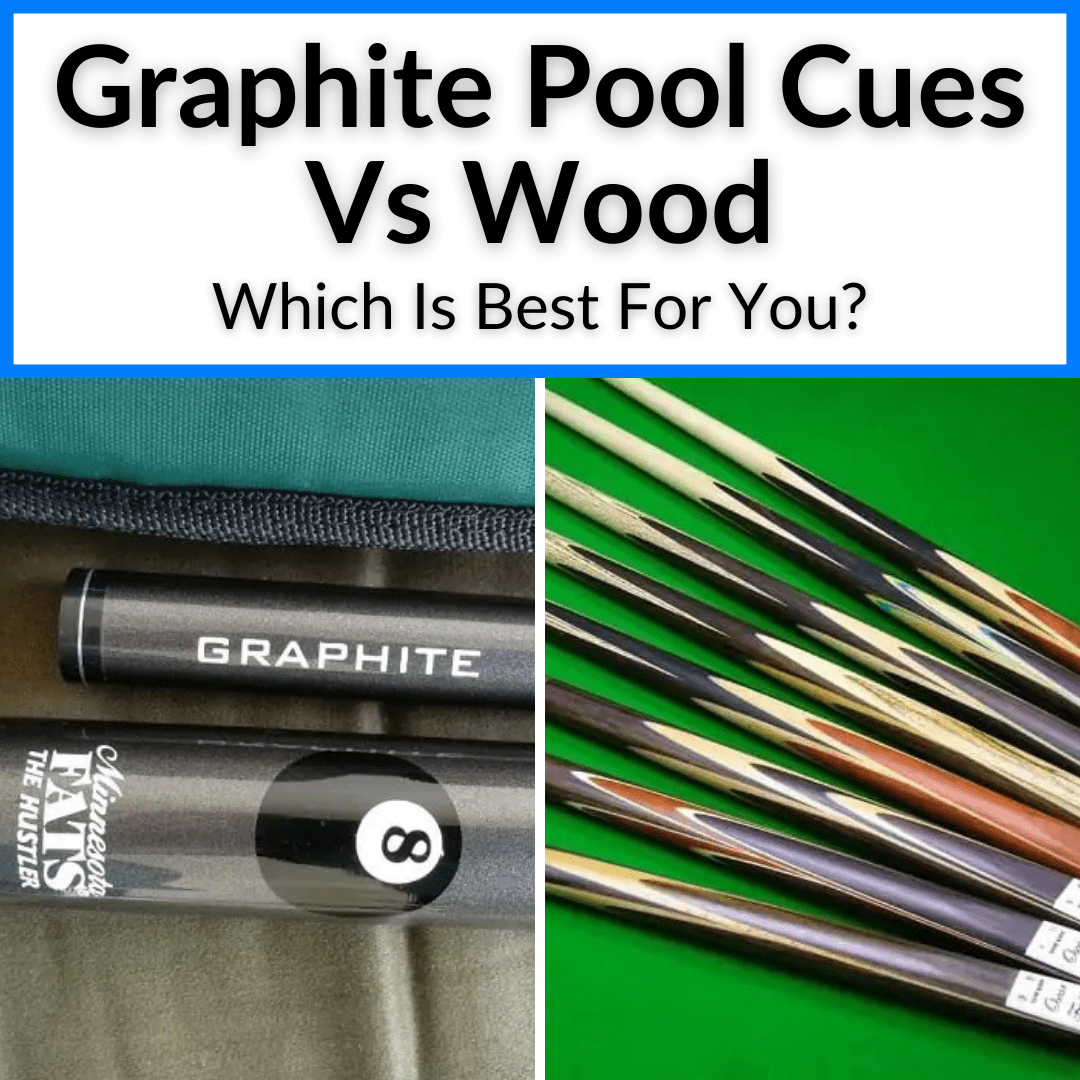 Finding the perfect pool cue is tough.
Finding the perfect pool cue is tough.
There are so many different options out there.
The first big question you need to answer is what type of material you want for your pool stick.
The most common and most popular material is wood.
But graphite and fiberglass sticks are on the rise.
Both have distinct advantages over wood that can make them a better option for beginning players.
Keep reading for a full breakdown of graphite pool cues vs wood, including the advantages and disadvantages of each. By the end, you will know which one is right for you.
Table of Contents
Graphite Pool Cues Vs Wood
Some believe that the material of the pool cue doesn’t matter. But that’s not our experience.
The pool cue material definitely affects the gaming experience. It also affects your performance in the game.
The primary material of a pool cue is the one that is used for the shaft.
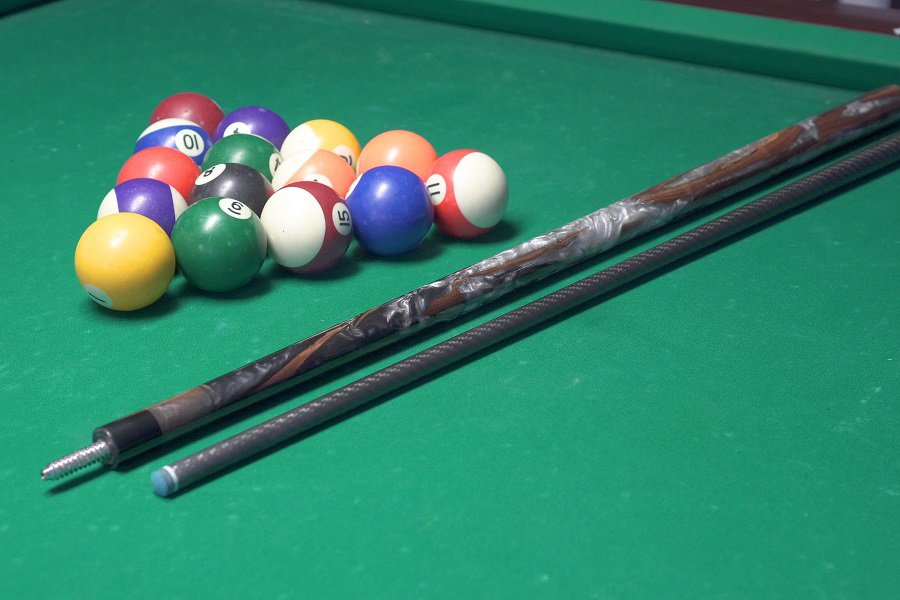
But the price, durability, and performance of a professional pool cue also depend on the material in other parts. The tip, wrap, ferrule, and joint are essential parts that also need to be made from quality materials.
Hard rock maple wood is the material used in most professional pool sticks. Snooker and English pool cues are usually made of ash wood.
But there are other variants of wood that manufacturers use in making the shaft of a pool cue. Some of them are:
- Red Ivory
- Ebony
- Brazilian Rosewood
- Cocobolo
- Blackwood
- Olive Wood
- Ziricote
- Bocote
Then there are materials other than wood that some manufacturers use. Aluminum, titanium, and acrylic are some of those alternative materials.
But almost every professional pool player prefers a wood pool cue.
Fiberglass and graphite pool cues are two of the newest alternatives. And some players actually prefer them.
They’re cheap and acceptable alternatives to wood. In fact, they tend to be less prone to warping and more durable.
But wood pool cues remain the standard and the vast majority of professional players still prefer maple wood cues.
Now let’s take a closer look at both types of pool cues and see what advantages and disadvantages each has.
Graphite Pool Cue Advantages And Disadvantages
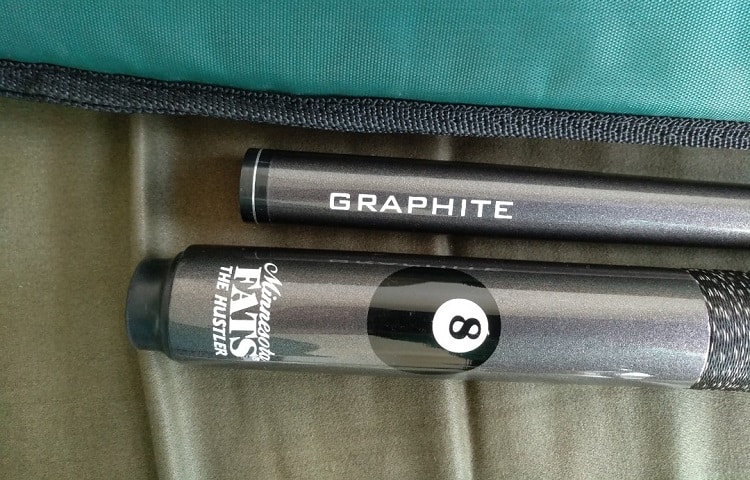
A graphite pool cue isn’t entirely made of graphite. It has an inner core made of wood, and the outer layer is made of a fiber composite layer.
The exterior composite layer is thin but very strong. That results in a more durable pool stick.
Some of the most expensive graphite pool sticks have special coatings. The coating layer protects the pool cue from damages. It also gives the cue a smooth glide between your hand bridge.
You can feel the difference between professional vs regular coating when playing with a graphite cue.
Graphite Pool Cue Pros
- Smooth: the finishing layer of a graphite pool cue gives it a smooth feel and glide.
- Scratch resistant: the protecting composite layer of these cues prevents damages from scratching.
- Easy to clean: you can easily clean a graphite pool cue because there is no worry about the warping of the material due to humidity or water.
- Price: graphite pool cues are usually less expensive than wood ones, making them especially good pool cues for beginning players.
- Durability: the composite material used in a graphite pool cue makes it more durable; it is also weather-resistant, and a beginner at pool will be able to play with the stick for a long time.
Graphite Pool Cue Cons
- Impossible to repair: graphite pool cues are not repairable; if you damage the surface with a strong scratch or anything else, there is little chance for you to play with that stick again.
- Feel: graphite pool cues are very stiff, and you don’t feel the genuine impact of the pool cue with the ball.
- Sticky: the outer protective layer of a graphite pool cue gets sticky over time, so you may lose the smooth glide between your hand bridge after a while.
- No advanced shots: graphite pool cues are not suitable for English, follow, or draw shots, which is why almost no professional player uses them.
Wood Pool Cue Advantages And Disadvantages
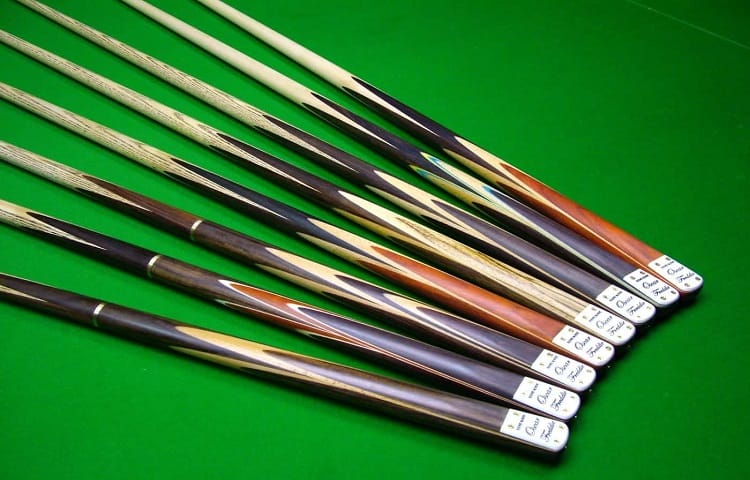
Wood pool cues, often made of hard rock maple, are the oldest, and still the most popular, cues. Because of the precise machining and finishing steps, the manufacturing process for some of these cues takes months.
Another standard material used in wood pool cues is ash wood. This type of wood is primarily used in snooker and English pool cues. Almost every collectible expensive pool cue is made of wood, too.
Wood Pool Cue Pros
- Can be repaired: if you damage your wood pool cue with scratch or ding, it can be repaired and used again.
- Feel: nothing feels more genuine than hitting the cue ball with a wood pool cue.
- Suitable for everyone: the best pool cue brands worldwide make their beginning to professional cues from wood.
Wood Pool Cue Cons
- Price: wood pool cues are usually more expensive than other materials like graphite and fiberglass.
- Prone to warping and scratches: a wood pool cue needs more care than other materials.
- Cleaning: you should clean your wood pool cue more often than a graphite cue; cleaning is also more difficult and requires specialized materials.
What Pool Cues Do The Professionals Use?
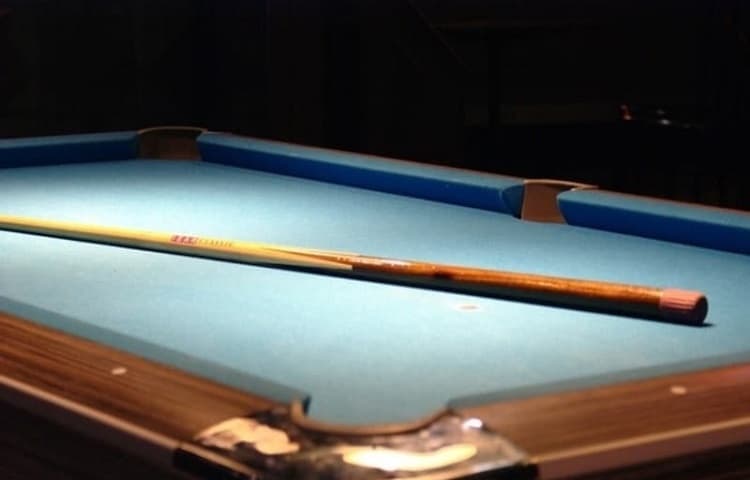
As mentioned before, many pool players prefer wood pool cues over all other alternatives. And when it comes to professional players, that preference is virtually unanimous.
Professional pool players like Efren Reyes use hard rock maple pool cues in tournaments.
One-piece wood pool cues are the most common choice among many professional players. But some of them prefer two-piece sticks, because they are more portable.
Many professional players prefer to play with the same pool cue over many years, because they get used to the feel of it.
What pool cue the pros use is not the only important question. You should also be asking yourself what cue tip the pros use. Without a good tip, even the best pool cue is useless.
Wood Vs Graphite Pool Cues: Conclusion
You first need to define your needs and your expectations, when deciding between graphite pool cues and wood ones.
Each type of pool cue serves specific needs and has specific pros and cons. While wood pool cues are more common, graphite ones can be perfect for beginning players.
If you don’t have the time and effort to maintain or clean your pool cue, a graphite pool cue can be a great choice. But if you prefer the genuine feel of wood and aspire to become a professional player, consider buying a wood pool cue.
Leave a Reply